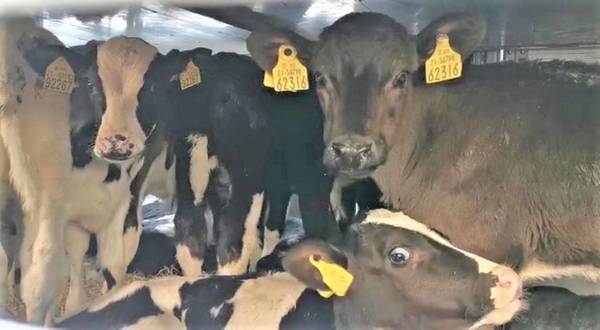
A joint letter has been sent to EU Animal Welfare Commissioner Olivér Várhelyi urging the Commission to halt the transport of unweaned calves from Ireland to France by roro ferry.
It follows a similar letter sent in February.
In 2022 the European Commission conducted an audit into the export of unweaned calves from Ireland to France and concluded that these journeys breach Regulation EC1/2005 on the protection of animals during long distance transport, because the feeding requirements were not being met.
Unweaned calves should be fed after nine hours if necessary or after a maximum of 19 hours. During this point the calves are on the ferry, and it is not possible for them to be given milk or milk replacer, says one of the letter signatories Caroline Rowley, Director, Ethical Farming Ireland.
“Rather bizarrely the Irish Authorities’ interpretation of the law is that there is no requirement to feed the calves at all, only if it is necessary to not cause harm and suffering. Depriving a 15-day-old animal of feed for more than 24 hours whilst dealing with the stresses of long distance transport will clearly cause harm and suffering. If 15-day-old puppies were treated this way there would be public uproar and rightly so,” says Rowley.
Ireland has sent over 400,000 calves on roros to France since the Commission 2023 audit report said that the trade breaches Regulation 1/2005.
Rowley said: “A trial was conducted by Teagasc with a truck with a feeding system transporting calves from Ireland to the Netherlands in October 2023, but it was not successful. Not all the feeders were working, and it was not possible to tell which calves had received feed or not. The truck driver had to crawl around on the truck floor contending with seven-meter-high waves. It’s a ridiculous idea.”
The trial bore little relation to commercial journeys, where around 300 calves are transported on three decks of a livestock vehicle, she says. In the trial just 38 calves were fed and all were placed in the bottom deck, as this was the only location deemed reasonably safe for personnel access during the ferry crossing. The paper states: “The practical use of the on-board feeding system was difficult, perhaps even impossible in its current form within the context of transport by sea and the variability of real-life sea conditions.”
Teagasc has recently published a tender for the design and supply of an on-truck calf feeding system; the expected time for completion is two years.
During this time a further 400,000 unweaned calves could be transported.
The letter is signed by:
Anima International: Kirsty Henderson President
Animal Justice Project: Claire Palmer MSc Zoology Director
Animal Law Italia: Alessandro Ricciuti CEO
Caring Vets: Nicole de Schwartz, President
Compassion In World Farming: Peter Stevenson OBE Chief Policy Advisor
Deutscher Tierschutzbund e.V: Thomas Schröder President
Dier&Recht: Frederieke Schouten CEO and Veterinarian
Dierenbescherming: Ellen Bien, CEO
Djurskyddet Sverige: (Animal Welfare Sweden) Åsa Hagelstedt Secretary General
Dyrevernalliansen: (Norwegian Animal Protection Alliance) Anton Krag CEO and Zoologist
Dzīvnieku Brīvība: (Animal Freedom Association) Katrīna Krīgere, CEO
Ethical Farming Ireland: Caroline Rowley Director
Eyes on Animals: Lesley Moffat, Director
Four Paws: Joe Moran Director FOUR PAWS Belgium
Hellenic Animal Welfare Federation: Irini Molfessi Chair of the Board
L214: Brigitte Githiere
La Fondation Droit Animal, Éthique et Sciences: Louis Schweitzer President
LAV: Lorenza Bianchi Head of Food Transition
Project 1882: Benny Andersson CEO
SEY Animal Welfare Finland: Pihla Markkola Head Expert (Farm Animals)
The Swedish Society for the Protection of Animals: Lillemor Wodmar President
Una Terra Foundation: Ervin Nagy President
Welfarm: Ghislain Zuccolo Directeur Général
World Animal Protection: Roger Pettersson CEO World Animal Protection Sweden
World Animal Protection Danmark: Mette Gervin Damsgaard Poltisk Chef/Director of Advocacy
World Animal Protection Netherlands: Julia Bakker Programmamanager Food Systems



